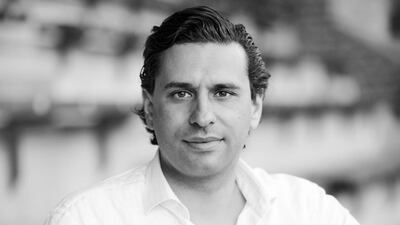A novel about the physical and mental trials of an Olympic athlete will be launched at the Sharjah International Book Fair on Thursday, November 12.
I Run To Eternity, translated from Portuguese into Arabic by Dar Noon publishing house in Ras Al Khaimah, is set during the 1912 Stockholm Olympic Games and is heavily inspired by the real-life tragedy of Portuguese athlete Francisco Lázaro.
Written by Portuguese career diplomat André Oliveira, 37, who is currently serving at the Embassy of Portugal in Sweden, the debut has also been translated into Swedish.
Oliveira says his work packs in themes of love, passion, friendship, migration, culture, perseverance “and the endless ambition of Lázaro, a youngster who does everything he can to win a gold medal and may set an example for many of us”.
Lázaro was the first Portuguese to compete in the Olympics marathon race. The 22-year-old from Lisbon had already won three national championships, so hopes were high that he would bring a medal home, where he worked as a carpenter in an automobile factory.
But at the 30-kilometre mark of the race, Lázaro suddenly collapsed and died. It was later discovered that Lázaro had covered himself with wax to prevent sunburn and this had fatally restricted his ability to sweat.
Oliveira was moved to write the novel because of what he saw as Lázaro’s steadfast perseverance.
“He was humble, with no financial means, but still with the strongest will to become the best,” he says.
I Run to Eternity is now a government-recommended book, taught in Portugal schools. Oliveira hopes it will also widen the world's interest in Portuguese sportsmen.
“Everyone knows Eusébio, Cristiano Ronaldo and José Mourinho,” he says. “So why not learn a bit more about Lázaro?”
It took Oliveira one Swedish winter to write the story. “It may sound like a short time,” he says. “But if you think that in Sweden in wintertime there is no daylight after 3pm, then you can imagine how feasible it was.”
Oliveira spent those long, dark evenings researching Olympic history in Stockholm’s libraries and exchanging views with historians, to get as close as he could to the real story.
“The humble Francisco Lázaro wanted to win and be the best, for his family and for his country. But Lázaro was also deeply emotional. He was in love with his wife, he loved sports to the utmost, and while preparing for the marathon he got confused, and sometimes angry,” says Oliveira.
“He smiled and laughed loudly, but also cried quietly standing alone at his dorm room. He was emotional, while being the most rational and competitive of the athletes to run the marathon in the Olympic Games that year.”
• I Run to Eternity will be launched at the Sharjah International Book Fair on Thursday, November 12, from 6.30pm to 7pm, at the Expo Centre in Sharjah. Visit www.sharjahbookfair.com
artslife@thenational.ae

